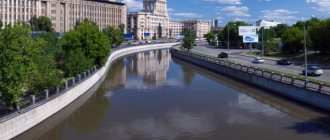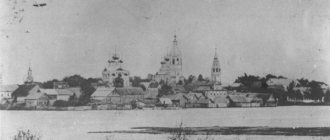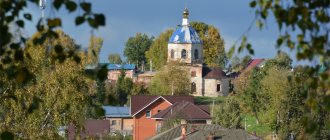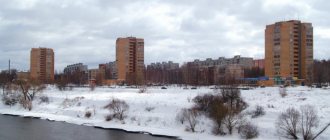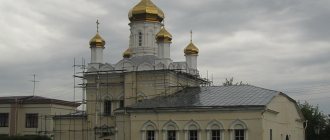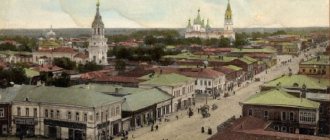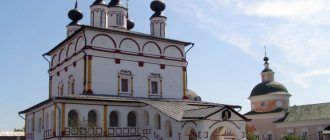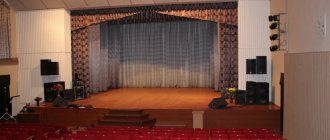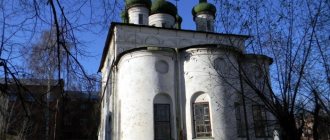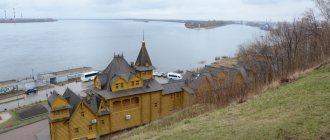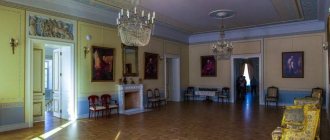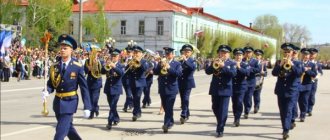Kirishi - attractions and what to see
The small town of Kirishi is located in the Leningrad region. It received city status only in 1965. Its population is slightly more than 50 thousand people.
Mention of the village of Kirishi can be found in historical documents from 1693. At the end of the 18th century, the village of Kirishi was part of the Soltsy estate and belonged to Alexander Fedoseevich Bestuzhev, the father of the famous Decembrists Bestuzhevs.
In 1931, the village of Soltsy was renamed the village of Kirishi, and the former Andreevsky district was renamed the Kirishi district. In 1932, part of the lands of the Budogoshchensky district was added to the Kirishi district.
Where is
The administrative center of Kirishi is located on the banks of the Volkhov River, in the south-eastern side of the Leningrad region on the border with the Novgorod region, and has geographic coordinates of 59°27' N. w. 32°01'E. d. The area occupied by the city is 63 km² with a population of 51 thousand people.
The distance between St. Petersburg and Kirishi in a straight line is 110 km, and along the road this distance increases to 155 km. Other nearby cities near Kirishi: Novgorod (120 km), Tikhvin (100 km) and Staraya Ladoga (72 km).
You can get from the Northern capital to the city in question by using an electric train, bus, or car. From St. Petersburg, electric trains with a stop in Kirishi depart from Ladozhsky and Moskovsky stations, while Kirishi is the junction railway station of the Moscow (Savelovsky Station) - St. Petersburg line.
And buses from the Northern capital - from the bus station located on the Obvodny Canal embankment (no. 36). By car you should drive along the St. Petersburg – Moscow highway to the village of Zuevo, where you turn towards Kirishi and drive another 39 km. along the Zuevo-Novaya Ladoga highway. The city does not have its own airport.
Travel from A to Z
The oil refinery is a city-forming enterprise and is one of the five largest factories in the country.
Kirishi received city status 1965 , and the first mention of the village of the same name dates back to 1693 . Where this name came from and what it means is unknown, apparently, it has some Finno-Ugric roots. The city is located on the right bank of the Volkhov , on the border with the Novgorod region. The distance between St. Petersburg and Kirishi is approximately 155 kilometers by road, and in a straight line between city centers - about 110 kilometers.
Over the course of several business trips, I managed to visit all the hotels in the city except two new ones: Sputnik and Edelweiss.
Hotels in Kirishi: - North - Sports - Sputnik - Edelweiss - Yunost
Most often I stayed at Sportivnaya. The north is remembered for its small cozy cafe with a unique food system. Both of these hotels justify themselves with a realistic price-quality ratio. Rooms in Yunost are already more expensive; by the way, Sportivnaya is a branch of the Yunost Hotel. The price of Yunosti’s rooms is influenced by the “show-offs of the hotel”: the doorman at the entrance and the dress code at dinner. To get to the hotel lobby you need to go through two doors. So, the doorman will open only one door for you - you have to take the trouble to open the other yourself! This is the service. You are not allowed to go to dinner at Yunosti's restaurant without a tie - there is a strict dress code. It turns out that there is one owner, two hotels that are almost identical at first glance and completely different price categories. It all comes down to a simple belief: people in ties earn more than people in sweatpants, which means they can pay more for a hotel. I heard only a brief description about Edelweiss: “A dormitory for workers.” The companion remained a mystery to me; he only knew that this hotel was located somewhere on the outskirts of the city.
My business trip coincided with some regular sporting events in Kirishi. All the hotels were full, even the expensive rooms in Yunost were occupied. I had to book a room in Sputnik, which was mysterious to me.
The business trip began with working moments. In a conversation with a colleague, the conversation turned to the hotel: “Where are you staying?” - In Sputnik... - Outside the city? Why there? These questions alarmed me, but the topic of conversation quickly changed to work again. From the factory I went to the hotel. I slowly trudged along Pobeda Avenue, trying to spot the colorful Sputnik (I saw the hotel on the website). Soon the buildings along the road ended, but there was still no sign of Sputnik.
A sign appeared to another settlement, and I was about to turn around, when suddenly a lime-white building appeared on the left in the middle of the forest.
I parked at the entrance. I pulled the right wing of the front door - it was closed. Strange, it seems too early to close for the night. I rang the bell and, just in case, pulled the left door and the door swung open. “A hotel for left-handers,” I thought and went inside. “First they would pull the door, and then they would ring the bell!” — the woman at the reception greeted me. I handed her my passport, she demonstrated her attitude towards me with all her appearance: “Let’s come in large numbers here!” — Cash, non-cash payment? - Cashless. “You have cash,” my aunt informed me, flipping through her notebook. — I meant that I would pay with a card. - We don't have a terminal. At this moment, the question of Wi-Fi disappeared by itself - where does such luxury come from?! Room 316. I went up to the 3rd floor and found my room. With difficulty he opened the broken lock. I opened the door and the smell of stuffiness hit my face. I saw a small room with two iron beds, I wonder if the linen was changed after the previous guests?
There were also two chairs in the room, a refrigerator, a stand with a TV and a kettle. The pale pink walls are stained in places with mosquito corpses and some greasy stains. There are cracks here and there, there are even holes.
I was surprised by the shower - there was a curtain and a drain on the floor.
From the usual: one socket at the cabinet - either you watch TV, or you boil the kettle, at the same time, no way.
My plasma is in the room.
The electrical wiring and furniture arrangement in the room are thought out to the smallest detail.
The fluorescent lamp on the ceiling beeps periodically; later I was very surprised that it beeps even when turned off.
It may not be a lamp, but something is constantly beeping in the room. Fire alarm sensor on the ceiling. Apparently, it didn’t install the first time, or it was done on purpose, like an installation of modern art with some deep meaning that I couldn’t figure out.
The hotel is more like a hostel. Most likely, because of the cheapness, watchmen live here who came to work at the plant. This confirms that the parking lot, empty during the day, becomes filled with cars with different region codes on their license plates closer to night.
Accommodation prices are indeed lower than in other city hotels, but the price-quality ratio is still unjustified.
The Satellite Corridor is a long, dark corridor with a bright white light at the end.
In the morning, the dining room offered a menu of six breakfast options. What a variety! True, all the options turned out to be different combinations of two out of five dishes: porridge, scrambled eggs, omelet, pancakes and hot sandwiches. The food is still delicious.
In my free time from work, I decided to take a walk around the city. I was wondering how Kirishi since 2010, when I first came here. And the city has really changed a lot. New tall buildings sprang up, Dixie and Magnets , and even a huge shopping center opened with a KFC . I hope that soon my favorite restaurant “ Golden Arcs ” will appear.
the city's sights again . By the way, there are few attractions in the city of Kirishi, and almost all of them are dedicated to the Great Patriotic War (in the first years of the war there were fierce battles on Kirishi soil).
Sights and interesting places of the city of Kirishi: - Kirishi Museum of History and Local Lore - Stele "Front Line of Defense of Kirishi" - Memorial "Echo of War" - Memorial "In Memory of those Fallen in 1941-1945" - Monuments to the Kirishi - Heroes of the Soviet Union - Monument to the tank T- 34 “Defenders of the Kirishi land 1941-1943” - Monument to the “Lost Villages” - Monument to Vladimir Ilyich Lenin - Monument to the “First Builders” - Memorial sign “The beginning of the offensive of the Soviet troops to liberate Kirishi” - Memorial sign in honor of the Decembrists Bestuzhevs - Memorial plaque to the “Builders” — Memorial plaque in honor of the revival of Kirishi — Memorial plaque to L. A. Koikolainen — Memorial plaque to V. N. Brovko — Memorial plaque to M. S. Voronin — “Kirishi” Stela — “Kirishi 1965” Stela — “Kirishi Torch” Stela — Volkhovskaya embankment – Church of the Nativity of the Blessed Virgin Mary
This time I didn’t take my camera with me. I photographed everything on my mobile phone - a kind of mobile photo reporter . What follows is a short photo report about a walk around the city.
Kirishi Museum of History and Local Lore
to the Kirishi Local History Museum again, maybe next time... The museum was opened on December 28, 1972 in honor of the fiftieth anniversary of the founding of the USSR. Museum address : Kirishi, Lenin Avenue, building 42. Visit the official website of the museum
Stele “The Front Line of Defense of Kirishi”
The stela “The Front Line of Defense of Kirishi” was installed in 1968 on the line of defense of the Soviet troops in 1943. Inscription on the stele:
“Glory to you, brave ones, glory to you, fearless ones! The people sing eternal glory to you: You who lived valiantly, who crushed death, The memory of you will never die!”
Monument to the T-34 tank “Defenders of the Kirishi land 1941-1943”
The T-34-85 tank was installed on a pedestal in 1968 in honor of the soldiers who fought on Kirishi soil in 1941-1943. The monument is located on Lenin Avenue near the entrance to the city. Judging by the modification of the tank, most likely it was released in 1945 and did not participate in battles, much less fought in Kirishi. But still, the T-34 is a worthy symbol of the difficult years of the Great Patriotic War. Next to the tank there are memorial plaques with the inscriptions: “Soldiers of formations and units of the 4th and 54th armies of the Volkhov Front took part in the battles for Kirishi” and “Kirishi was liberated by the 1071st Infantry Regiment of the 311th Infantry Division, the 215th Division Machine-Gun Artillery Battalion of the 44th Infantry Division, 32nd Division armored trains." On October 4, 2008 (on the day of the 65th anniversary of the liberation of the Kirishi land from the Nazi invaders), monuments to the Kirishans - Heroes of the Soviet Union Sergei Nikolaevich Ulyanov and Alexander Ivanovich Sidorov (the titles were awarded to them posthumously) were erected next to the tank.
Memorial sign “The beginning of the offensive of Soviet troops to liberate Kirishi”
A ZIS-3 artillery gun of the 1942 model is installed on a hill near the intersection of Pobeda Avenue and Heroes Avenue in 1983. On the memorial plate under the cannon there is an inscription: “To the Soviet soldiers who liberated Kirishi on October 4, 1943.”
Aimed somewhere towards the new Magnet.
Monument to the Lost Villages
The composition is made in the form of two hands holding a granite slab with a map of the Kirishi land and the names of villages and towns that disappeared in the flames of war. A bell hangs over the stove.
Memorial "Echo of War"
The Echo of War Memorial is the ruins of the only building remaining in the city after the war.
In 1967, a memorial plaque with lines from Alexey Aleksandrovich Surkov’s poem “Raise your voice, honest people!” :
“Before the throats of the guns roar and the walls fall on their faces, Raise your voice, honest people, Tear off the masks from the murderers!” (1947)
Memorial "In memory of those who fell in 1941-1945"
The memorial “In Memory of those Fallen in 1941-1945” was built in 1970 in Victory Square on the site of a mass grave where more than four thousand soldiers who died in battles for Kirishi land during the Great Patriotic War are buried. In the center of the composition is the Eternal Flame , which is lit from the Eternal Flame of the Piskarevsky Memorial.
Around the Eternal Flame there are five steles, symbolizing banners bowed in sorrow. The names of the heroes who defended the Kirishi land are carved on the steles and memorial plaques installed nearby. Under each stela there is a slab with lines from the poem “Requiem” ( “Eternal Glory to the Heroes!” ) by Robert Ivanovich Rozhdestvensky.
"People! While hearts are knocking, - Remember! At what price was happiness won? - Please remember!” (1962)
Next to the Eternal Flame there is a monument with carved lines from the poem “Immortality” by Alexander Andreevich Prokofiev:
“... He fell, our comrade, But the Immortality that was nearby rose above him.” (1941)
Near the memorial there is a memorial sign “ In memory of those killed in Afghanistan and Chechnya . ”
Memorial sign in honor of the Decembrists Bestuzhevs
The memorial stone was erected on December 14, 1991 in memory of the stay of the Decembrists Alexander, Nikolai, Mikhail and Pyotr Bestuzhev on Kirishi soil.
City administration building
Monument to Vladimir Ilyich Lenin
The monument is located opposite the city administration building. It seems that this is where Grandfather Lenin is going to restore order, but he still won’t get there.
Gift from PetroKINEF.
The guns are located not only on the outskirts of the city, but also in the center.
Sports Palace "Neftyanik"
It is a rare case when advertising posters do not lie - here, indeed, “the road to Olympic medals begins.” Kirishi is one of the main centers for the development of women's water polo in Russia. Neftyanik is the venue for major international water polo competitions, as well as the training base for the Russian national team. The city team "KINEF-Surgutneftegaz" is a multiple champion of Russia, the team's athletes form the basis of the country's national team.
SURGUTNEFTEGAZ - local GAZPROM in the city of Kirishi
Autumn in the city of Kirishi
City drawings
Church of the Nativity of the Blessed Virgin Mary
Volkhovskaya embankment
Stele "Kirishi 1965"
I couldn’t find some of the attractions in the city, but found them on the Internet.
Stele "Kirishi Torch"
Monument to the "First Builders"
Memorial plaque to the "Builders"
A memorial plaque was installed on the facade of building No. 2 on Stroiteley Street during the celebration of the fiftieth anniversary of the USSR. The inscription on the plate: “BUILDERS STREET IS NAMED IN HONOR OF THE BUILDERS WHO ERECTED THE KIRISHI ENERGY INDUSTRIAL COMPLEX AND THE NEW SOCIALIST CITY ON LENINGRAD LAND.”
Memorial plaque in honor of the revival of Kirishi
The memorial plaque was installed on October 4, 1968 on the facade of house No. 1 Pionerskaya Street. The inscription on the plate: “IN CELEBRATION OF THE REVIVAL OF KIRISHI STARTED WITH THIS HOUSE IN 1961, THEIR TRANSFORMATION IN THE YEAR OF THE 50TH ANNIVERSARY OF SOVIET POWER INTO A CITY OF REGIONAL SUBMISSION, THE KIRISHI PEOPLE INSTALLED THIS MEMORABLE PLATE ON THE DAY OF THE 25TH ANNIVERSARY OF THE LIBERATION OF KIRISH RISH LAND FROM THE GERMAN-FASCIST INVADERS."
Memorial plaque to Koikolainen L.A.
A memorial plaque was installed in honor of the honorary citizen of the city of Kirishi on the facade of house No. 7 Pionerskaya Street. The inscription on the plate: “In this house since 1963. to 1976 lived an honorary citizen of the city of Kirishi, who made a significant contribution to its development, LEV ALEXEEVICH KOIKOLAINEN.”
Memorial plaque V. N. Brovko
A memorial plaque was installed in honor of the honorary citizen of the city of Kirishi on the facade of house No. 13A Lenin Avenue. The inscription on the plate: “In this house from 1974 to 2007, the general director of the oil refinery, honorary citizen of the city of Kirishi, Vladimir Nikolaevich Brovko lived.”
Memorial plaque to M. S. Voronin
A memorial plaque was installed in honor of the honorary citizen of the city of Kirishi on the facade of house No. 7 Pionerskaya Street. The inscription on the plate: “The first director of the Kirishi Oil Refinery, Mikhail Sergeevich Voronin, lived in this house from 1962 to 1968.”
Sights and interesting places on the map of the city of Kirishi
Weather in Kirishi, best time to travel
The city of Kirishi is located in an area with a cold temperate climate. Here, throughout the year, there is a significant amount of precipitation with an average of 647 mm. and an average temperature of 4.0 °C. Climatic conditions by month in Kirishi can be shown as follows:
| Month: | Air temperature during the day (°C): | Air temperature at night (°C): | Precipitation (mm): |
| January | -6,5 | -8,1 | 50 |
| February | -3,5 | -6,3 | 41 |
| March | 0,3 | -4,1 | 35,4 |
| April | 7,9 | 1,4 | 60 |
| May | 16,6 | 8,0 | 59 |
| June | 20,1 | 11,5 | 68 |
| July | 23,1 | 13, | 77 |
| August | 21,6 | 13,0 | 70 |
| September | 15,6 | 9,0 | 58 |
| October | 6,8 | 3,0 | 51 |
| November | 1,5 | -0,5 | 54 |
| December | -2,5 | -4,1 | 54 |
The territory where the city of Kirishi is located belongs to the Ilmen-Volkhov lowland and more than 60% of this area is deciduous forests, and swamps occupy about 17% of the area.
The time of year to come to the city of Kirishi for tourism purposes is selected individually, depending on the preferences of the tourists themselves. Traditionally, the most convenient months in this regard are considered to be the period from May to September inclusive.
Economy and industry of Kirishi
The city-forming enterprises are based on the petrochemical industry. The most important organization in the city is the oil refinery.
Among the large enterprises, it is worth noting the plant for the production of glass containers. There are also other organizations and companies in the city:
- Neftezavodmontazh is engaged in the installation of technological equipment.
- The design and construction of pipelines is carried out by Sevzapenergomontazh.
- Abitek sells petroleum products.
- Penoplaks produces materials from polymers.
Also in the city there is a bakery and a Ladoga enterprise that produces raincoats and hats. The region grows vegetables, grains and potatoes. Cattle and pigs are also raised.
Religious buildings in Kirishi
Kirishi, whose sights are closely connected with the history of the city, was first designated as a village in 1693. This village grew into a working settlement in the 20th century, and during the Great Patriotic War it was completely destroyed as a result of heavy fighting. At the end of the war, the village was restored, and in 1965 it received city status. In Kirishi, as in all Russian cities, there are churches for believers.
Church of the Nativity of the Blessed Virgin Mary
The Church of the Nativity of the Blessed Virgin Mary (Kirishi, Stroiteley St., 50) was built from 1996 to 2013. By its definition, this stone church is single-altar, designed for the simultaneous presence of up to 500 people.
The temple was designed by the Lengiproneftekhim Institute and financed by the Kirishi oil refinery. The temple building looks beautiful and aesthetically pleasing, with all Orthodox attributes and well-groomed grounds. Inside the room is decorated with frescoes and the walls have a yellowish tint. Services and visits by parishioners are held here as scheduled.
Holy Trinity Church
The Holy Trinity House Church (Kirishi, Mira St., 10) was created on the initiative of the Orthodox citizens of the city in 1992. The premises for religious purposes were determined on the ground floor of a five-story building. The very illumination of this temple and its throne was carried out in 1993. The church is operational.
Church of the Nativity of John the Baptist
In the Kirishi district, in the village of Motokhov, there is a three-altar church in the name of John the Baptist, Great Martyr George and the Intercession of the Most Holy Theotokos. The temple was founded in 1701 and was built of wood. The church burned down twice and was rebuilt in brick in 1852. At this time, the religious building is not used for its intended purpose and is in a dilapidated state.
Kirishi Museums
Kirishi is a small city in all respects. There are not so many attractions to which the concept of museums refers. These include:
Museum of History and Local Lore
Kirishi Museum of History and Local Lore (Kirishi, Lenin Ave., 42) - opened in the city of Kirishi in 1972 and occupies an area of more than 400 m².
The halls of the museum display a lot of materials of folk art and craft - Kirishi lace and information about the most famous craftswomen in this area. A lot of space in the museum is occupied by the military section exposition. Numerous exhibits of captured weapons and equipment are presented here.
The museum contains collections:
- Zakhozhskoe (Kirishi) lace.
- Artistic.
- Ethnographic.
- Photos of the formation of the city.
- Energy-industrial complex.
The museum is open daily except Sunday and Monday. The ticket price ranges from 30-70 rubles. and higher, depending on the age of the person and the provision of the excursion service.
Museum of Nature
Founded in 2003, the Museum of Nature in Kirishi is located in a relatively small area on the street. Sovetskaya, 16 in the building of the Palace of Culture of KINEF LLC. Shown here are birds and animals living in the Leningrad region.
The museum's exposition itself consists of thematic dioramas in accordance with the seasons. During the excursion, you can hear sound design - the voices of animals, birds and other natural manifestations. Animals that died in the wild or hunting trophies are used for exhibits in this museum.
Kirishi Art Gallery
The art gallery in Kirishi (Volkhovskaya embankment, 18) is designated as a small cultural center of the city. There are works of painting and sculpture here.
The works of both local artists and sculptors, as well as art masters from other regions of the country are presented. This gallery hosts several exhibitions throughout the year. The gallery is open to the public every day from 11:00 to 18:00, except Sundays. Entrance here is free.
Don't miss the most popular article in the section: Metro Nizhny Novgorod. Diagram, map, description.
Coat of arms, flag
The city of Kirishi, Leningrad Region, acquired a flag and coat of arms in 2006. This happened by resolution of the Council of Deputies. The coat of arms has the shape of a French shield of azure color. It depicts two rooks. They act as symbols of the ancient trade routes that passed along the Volkhov River - from the Varangians to the Arabs and from the Varangians to the Greeks. There is a circle between the rooks. In its center are two azure figures, personifying the unity of the Kirishi fuel and energy complex and the flame of the caring hearts of the first Komsomol builders.
The coat of arms was developed for the reason that a new law on local government came into force. According to this document, each municipality is required to have its own coat of arms and flag. The latter was compiled by the Kirishi authorities on the basis of the coat of arms. It acts as a symbol of the municipality in question and a sign of the unity of the local population.
Monuments in Kirishi
Along with other cities, Kirishi has monuments of various types. Taking into account the fact that the city is quite young, and fierce battles took place in its place, many sculptural objects date back to the Great Patriotic War.
Monument to the First Builders
This monument (Entuziastov Highway, 12) is a pedestal with a statue of a working man installed on it, who, using a conventional tool, extracts an element of an anti-tank barrier from the earth's surface. This monument returns to the time when the city was just beginning to be built after the destruction during the war.
Memorial to the Lost Villages
In the center of the city of Kirishi, in a fairly well-kept and picturesque place, there is a small and quite original memorial to the “Lost Villages”.
The monument represents two human hands holding a mournful slab, and on it are engraved the names of rural settlements destroyed by the war. Benches are installed next to the monument.
Monument “Echo of War”
This monument is located in the city on the street. Leningradskaya, next to the road bridge and belongs to the cultural heritage of the peoples of Russia. A line of defense ran at the site of the memorial for two years.
Before the war, there was a toy factory on this site, but after the war, ruins remained. They were preserved and ennobled by installing a memorial slab with a plaque on the foundation of the building. This plaque depicts military-themed poems by the poet A. Surkov
City `s history
Kirishi district is located in the southeast of the Leningrad region. Its area is 2,934 sq. km. The city of Kirishi, the center of the region, received its name from the village of Kirishi, the first mention of which in archival documents dates back to 1693. It was a small village located in a picturesque place on the shore of a lake, connected to the Volkhov River by a narrow and short river channel.
At this time, the village had only 20 households, the adult population was 106 people. All the peasants of the village of Kirishi, as well as the lands occupied by arable land, mowing and forests, were the property of the Novgorod landowner Vislenev. When the volosts were formed in 1708, Kirishi was assigned to the Soletskaya volost of the Novoladozhsky district of the St. Petersburg province.
On the left bank of the Volkhov, just north of the current road and railway bridges, there was the village of Soltsy, in which in the first half of the 19th century the poor estate of the Decembrists Bestuzhevs was located.
By the way, in the same village there was a stone church of the Nativity of the Virgin Mary, built in 1717 (turned into a club in 1935, and blown up by the occupiers during the war). The place where the church was located is the left bank of the Volkhov opposite the current boat garages - 600-700 m north of the railway bridge.
The village of Soltsy, renamed New Kirishi in 1931, became the center of the Kirishi district, which appeared after the unification of the Budogoshchsky and Andreevsky districts. The renaming of the ancient village of Soltsy to New Kirishi was undertaken because by that time there was already a Soletsky district in the Novgorod region. And on the opposite (right) bank of the Volkhov, near the Kirishi railway station, the workers' village of Kirishi appeared, whose residents worked at a sawmill and a standard house-building factory, which arose on the basis of the former German concession that existed here in the 20s. A chemical plant was also built here, which was supposed to be operational before the Great Patriotic War.
The village of Kirishi, like the railway station, received its name from the name of the village that has been known since the end of the 17th century. The origin of the name Kirishi has several versions, but most likely its explanation goes back centuries, when our lands were inhabited by Finno-Ugric tribes. By the way, the village of the same name is located on the territory of the neighboring Volkhov district. Therefore, one of the versions about the first settler named Kirill or Kiryan, as explaining the origin of the name of the city of Kirishi, disappears.
Before the Great Patriotic War, the village of Kirishi developed intensively. From the railway station in a southern direction there was a sandy road with plank sidewalks. The central street was called Zavodskoy Avenue, on both sides of which there were cottage-type houses. Houses were located in separate groups, each enterprise had its own group of houses. Closer to the river there were houses where engineering and technical personnel lived.
Behind the railway was the village of Dobrovolny, and to the south of the village of Kirishi, in addition to the above-mentioned village of Kirishi, there were two more - the village of Plavnitsy on the bank of the Plavnitsky stream, which flowed into the Volkhov, and the village of Novinka. Between all these villages the distance was 1.5 - 2 km.
The population of the working-class village of Kirishi and its surrounding villages was about 6,434 people. There were a lot of young people, as always happens where construction is going on, because the complex of pre-war Kirishi enterprises was eventually supposed to grow into a powerful timber and chemical plant.
A two-story high school, a hospital, several clubs at industrial enterprises, and a large stadium with a parachute tower near the railroad were built in the village. The village was distinguished by its active sports life. All regional institutions were located in the regional center on the left bank, in New Kirishi (formerly the village of Soltsy). Crossing the river was carried out on ice in winter, and by boat in summer. The railway bridge was wooden until 1936, but in 1936 a metal one was built. The current railway bridge, restored after the Great Patriotic War, is located very close to the place where the old one was, and in appearance it is very similar to the pre-war one, since during its restoration the surviving parts of the structure were partially used. The rapid development of the pre-war industry of the village of Kirishi occurred during the first two five-year plans. During this time, the sawmill grew into a timber processing plant with 1,500 employees. During the year, 130 thousand cubic meters were processed here. m of wood. A standard house-building plant also developed, one of the few in the country at that time. Before the Great Patriotic War, it produced more than 265 panel houses per year for the southern regions of the country.
The war struck Kirishi, as well as the whole country, unexpectedly and fearfully. Despite this, the evacuation of the population and enterprises took place in an organized manner, as far as possible in that situation.
Already at the beginning of September 1941, the invaders came to the village of Kirishi, but on September 10 they were driven out from here by soldiers of the 311th SD, formed in the city of Kirov, they held this line on the Volkhov River until October 28, 1941, but after that the Nazis crossed the Volkhov River near the town of Chudovo and bypassed the village of Kirishi from the east, capturing the village of Budogoshch on 23.10, and on 28.10 they managed to break through the defenses of the 311th Rifle Division. near Kirishi and move your armada north from the village of Kirishi to the village of Pcheva. After some time, the territory of the region was completely occupied. The enemy was eager to join forces with the Finnish troops advancing from the north, in order to thus cut off the “road of life” and enclose Leningrad in the second ring of the blockade. This explains the stubborn battles of the Nazis to preserve their bridgehead, which they created on the territory of the village of Kirishi.
During the military operation near the city of Tikhvin, when on December 9, 1941, the Nazis for the first time on the territory of the USSR felt the blow of our troops, who by the end of December 1941 defeated the entire Volkhov group of the Nazis, thanks to which almost the entire Kirishi region was cleared of the enemy by January 1942 .
But a small southwestern section of the region, including the village of Kirishi, remained in the hands of the Nazis for a long time as a well-fortified bridgehead. The ruins of the chemical plant and timber plant were used by the Nazis as powerful fortifications. Marshal Kirill Afanasyevich Meretskov in his book “In the Service of the People,” analyzing the battles on the Volkhov Front, noted the importance of the battle on the enemy’s Kirishi bridgehead as the most important for the defense of Leningrad.
The village of Kirishi was liberated on the night of October 3-4, 1943. The former village of Kirishi appeared completely destroyed before the liberators. In place of houses and businesses there are trenches, craters, dugouts and a huge number of combat-ready mines and shells.
After clearing the mines, local residents returned here, first built dugouts along the bank of the Volkhov, and later cut down wooden houses. The regional center was located in the village of Budogoshch. But life returned here slowly. Suffice it to say that after the decision of the Council of Ministers of the USSR was made to build an oil refinery and power plant on the site of the pre-war village of Kirishi, by the start of construction the local population was here a little more than 500 people.
The purpose of the construction of the KNPZ is to improve the fuel balance of the North-West, saving on the transportation of fuel from distant regions of the country.
Reasons for construction in Kirishi:
- Convenient transport connections by rail from south to north (Chudovo-Volkhov) and from west to east (Mga - Pestovo)
- Availability of full-flowing Volkhov
- Economic and geographical favorable conditions (Kirishi is located on a direct line between Leningrad and Yaroslavl - an oil pipeline has been laid from Yaroslavl to Kirishi, and a product pipeline for pumping fuel has been laid from Kirishi to Leningrad)
- Construction conditions - the plant and the city are located in a free undeveloped area
- Special non-draining soils, which is very important for maintaining a clean environment in oil refining areas.
The builders came from different regions of the country and for accommodation (until the city was built) temporary workers’ settlements were created - Yuzhny, Solnechny, Lesnoy, where housing was built in the form of barracks and cottages. In 1963, the Kirishi construction project was declared an All-Union Shock Komsomol construction project. Since 1964, student construction teams began to arrive in Kirishi.
01/12/1965 By decree of the Presidium of the Supreme Council of the RSFSR, the village of Kirishi was transformed into a city and the Kirishi district was recreated within the previous (before 1962) borders (from 1962 to 1964 our district was annexed to the Volkhov district).
The first residential building was built on Pionerskaya Street in 1961; by the way, the builders encountered a large number of unexploded shells at this site.
The city of Kirishi expanded its borders and occupied the territory of the former villages of Novinka and Plavnitsa. In 1975, the population of Kirishi was 50,000 people; as of September 1, 2021, there are 50,079 people in Kirishi.
Architectural structures in Kirishi
Kirishi, which does not have a large number of architectural attractions, can still offer a number of buildings for inspection. All of them were built in the post-war Soviet era. These include:
Palace of Culture "Kinef"
The Palace of Culture "Kirishinefteorgsintez" (Sovetskaya St., 16) is a real cultural, musical and theatrical center of the city of Kirishi. The palace building was built in the architectural style of the Soviet era and was seriously reconstructed in 2003-2005.
This facility owes its existence to the enterprise of the same name, the largest oil refinery in the Leningrad region. The cultural center houses a nature museum, a concert hall and a room for musical and literary events. There are also separate halls for celebrations, dance evenings and an English courtyard.
Separately, it is worth noting the presence of an atrium (705 m²) in the cultural center, where an artificial pond, a winter garden and a small stage are located.
Sports Palace "Neftyanik"
In Kirishi, on the basis of the Neftyanik Sports Palace (Stroiteley St., 5), the men's and women's water polo teams of the Russian Federation are training. In essence, this facility is a swimming pool that meets international requirements. There is a swimming pool with stands, a games room and a gym, rooms for coaches with teaching rooms.
Rooms have been allocated for changing clothes for athletes, rooms for the referee team and medical personnel. For the normal functioning of the sports center there is a cafe and administrative and household areas. The building of the Sports Palace itself is a structure made of glass and concrete.
Biochemical plant building
The biochemical plant in the city of Kirishi (Volkhovskoe highway, 11) began to be built in 1972, the plant began producing products in 1974. And in 1990, due to environmental problems, the plant was completely stopped.
Abandoned oil refinery in Kirishi
Currently, several organizations are located on the territory of this facility. Most of the buildings of the enterprise have been preserved and are of considerable interest to people involved in industrial tourism. The entire complex of buildings of this plant is quite remarkable and recognizable in the city.
Interesting places
The map of the Leningrad region with cities includes many places of interest to travelers. Among the most famous is Vyborg. Here you can see an ancient castle (13th century), a Horned Fortress (17th century), a monastery with a Gothic church (14th century) and much more.
In Tikhvin, you are invited to admire the ensemble of the Bogoroditsky Monastery and wander around the house-museum of Rimsky-Korsakov.
Priozersk is interesting for its well-preserved ancient fortifications - the Round Tower with earthen ramparts and a defensive wall, as well as the Old and New Arsenals built in the sixteenth and eighteenth centuries, respectively.
Natural attractions of Kirishi
Looking at Kirishi, we can say with confidence that this city is simply surrounded by nature. Rivers, dense forests and swampy lowlands are all present in the vicinity of the city. The rich natural landscape is the calling card of Kirishi.
Volkhov River
The city of Kirishi is located on the fairly deep Volkhov River. This river is interesting because it is the only water artery flowing from Lake Ilmen. The second feature of the river is the periodic change in flow direction. This is due to the extremely small difference in height between the beginning and end of the river. One of the favorite vacation spots for residents and guests of the city of Kirishi has become the Volkhov embankment.
Volkhov Reservoir
Another place for recreation on the water in Kirishi was the Volkhov Reservoir.
This reservoir is of artificial origin and appeared as a result of the construction of the Volkhov hydroelectric power station in 1926. The total area of the man-made lake is 2 km². On the shore of the reservoir you can relax both in a calm mode and in noisy groups. Swimming, sunbathing and fishing are available.
Natural Park "Dry Islands"
Near Kirishi, on an area of 500 hectares, lies the natural monument “Sukhodolsky Islands. This object is part of the larger “Fox Moss” bog massif and was founded in 1993. The park contains dry islands with untouched nature. The park is under state protection, but people are allowed to walk around it freely.
Recreation center "Dream"
Near the village of Budogoshch in the Kirishi region there is a health complex “Dream”. This place is surrounded by pine forests and forest lakes with clean water. Every year several thousand guests, including children, relax here. A full range of sports and tourism equipment for both summer and winter purposes is available to guests of the complex.
And for recovery, the most modern methods and equipment are used. The cost of living (without treatment) averages 1.2-1.5 thousand rubles. day per person. This price may vary depending on accommodation conditions.
Other cities of the Leningrad region. Brief information
The conditional division of settlements in the specified region is as follows:
— Ancient ones, with a long history, such as Kingisepp, Vyborg, Yakhvin.
- Young people, educated thanks to the development of industry during the Soviet period - Volkhov, Boksitogorsk, Slantsy, Kirovsk, Podporozhye, Pikalevo.
— Cities directly related to the construction and further development of the Northern capital: Lodeynoye Pole, Lomonosov, Gatchina.
The most ancient settlement is Vyborg. It was founded back in 1293. The youngest is Volosovo. This city appeared in 1999.
Modern objects in Kirishi, interesting to visit
Kirishi, whose attractions are not so numerous, there are places here that can surprise city guests. These include modern objects:
"Globe" - an art object in Kirishi
In Kirishi on the square. In Brovko, a stele of the author’s work was installed, having the shape and design of a globe. An electronic display board runs along the equator of the globe model. And along the strip of this board the exact time of the largest urban megacities on Earth is displayed.
Club "Atlas"
In the city of Kirishi there is a rather interesting and attractive place - the Atlas club (Lenin Ave., 4), decorated in the format of an anti-cafe. In the clubhouse you can spend time drinking a cup of coffee or tea with delicious cookies, and take part in various master classes and trainings.
Visitors to this establishment are offered the opportunity to conduct tastings, participate in seminars and play board games.
Club-cafe "Metelitsa"
The Metelitsa entertainment complex in Kirishi (Emergency lane, 2) has a cinema, a cafe and a nightclub. The cuisine here is defined as being of fairly high quality with a reasonable price. In this place you can rent a room for corporate and festive events. This establishment is open from 10-00 to 4-00, and from Fri. to Sun. it is open from 10-00 to 5-00.
Interesting places to relax with children
There are enough places in Kirishi where you can relax with your children and find exciting and interesting activities for them. Such urban infrastructure facilities include:
Rogers Park Active Recreation Park
“Rogers Park” (Kirishi, Geroev Ave., 33) has an area of 800 m². and is part of the Kirishi Plaza entertainment complex. This territory has a large number of children's entertainment from a football field, air hockey and carousels, to air cannons and a game labyrinth.
And this is only part of the children's entertainment. There are also rooms for birthday parties. The park is open from 10-00 to 21-00 (Monday - from 14-00 to 21-00).
Park of Culture and Recreation
The most relaxing and entertaining place for families with children can be considered the Park of Culture and Recreation in Kirishi. It is here that wonderful attractions and short, calm horse rides and interesting quests for children are provided for children and adults.
Programs ranging from musical to circus performances take place here. And all this happens in the fresh air near the embankment of the Volkhov River at the address: st. Sovetskaya, 24.
Ice Arena "Kirishi"
For fans (adults and children) of year-round skating, there is an ice arena in Kirishi (Neftekhimikov St., 24-B). There is an indoor skating rink with artificial ice covering, which provides both training events in figure skating and hockey, as well as regular public skating.
The arena has a stand with 200 seats and a special area with a ramp for people with limited mobility.
Route for exploring Kirishi on your own
Kirishi, whose sights can be easily explored in one day, is a fairly compact city. Tourists can choose any sequence of an introductory walk around this city.
Before the lunch break, you can take a leisurely walk throughout the city for 3 hours, starting at 10-00. You need to walk along two central avenues - Heroes and Lenin, go out to the city embankment, visiting monuments and military themes.
After lunch at 13:00 there is an opportunity to visit the Local History Museum and Art Gallery. After these visits, at 16-00 you can go to get acquainted with the Neftyanik Sports Palace, where you can go ice skating.
And then visit the Kinef Palace of Culture. In the evening, you can go to any cinema in the city to watch an interesting film, and then go to the hotel to sleep, or visit one of the nightclubs.
Kirishi Local Lore Museum
It was opened in 1972. The museum's exhibitions are of particular interest to those who are interested in archaeology. The unique collection is represented by flint tips for spears and arrows, ancient stone axes, sinkers and many other household items of our distant ancestors (pokers, grips and sickles). There is also an opportunity to examine in detail the amazing Zakhozh lace, which contains the features of authentic peasant art, which is minimally influenced by overseas trends.
Several showcases have been organized on the basis of the local history museum, allowing you to learn more about the Decembrists Bestuzhevs. The small estate of this family was previously located on the banks of the Volkhov in the village of Soltsy.
With particular interest, visitors examine the porcelain dishes of the famous master Kuznetsov.
Another section of the museum is dedicated to the infamous period 1941-1945. It presents materials found in battlefields - bombs, anti-tank weapons, rifles, shells, as well as household items - glasses, wedding rings, coins, razors and other things.
Hotels in Kirishi
For recreation and accommodation in the city of Kirishi for tourists there are a number of hotels and inns, for example:
- Hotel "Yunost" (Lenin Ave., 22) is a multifunctional complex with opportunities for both comfortable relaxation and holding conferences and exhibitions. The hotel has room categories from “apartments” to “suites”. There is a restaurant, conference room and business center. A gym, sauna and much more are available to hotel guests. The cost of hotel accommodation is from 4 thousand rubles. per room.
- Hotel “Sputnik” (Pobedy Ave., 40/4A) – there are 111 rooms of varying comfort, single and double types. There is a standard range of services for guests of the establishment, car parking, free breakfast. The cost of living here starts from 2 thousand rubles. per person per day.
- Hotel "Sportivnaya" (Romantikov St., 2) is quite modern and comfortable for living, with 68 beds. It has a cafe, free parking and a rehabilitation center. It offers a buffet breakfast, and each room has a TV and private bathroom. Prices for accommodation in this hotel start from 2.3 thousand rubles.
- Hotel “Sever” (Pobedy Ave., 10A) – designed to accommodate 44 people. in 22 rooms of the “Standard” category, which have a refrigerator, TV and other necessary hotel amenities. Cost of living – from 2.3 thousand rubles.
- Hostel “VKirishi” (Energetikov, 36) is a spacious apartment of 4 rooms, designed to accommodate 20 guests. The hostel rooms have the necessary household appliances and Wi-Fi. The cost of living starts from 1.5 thousand rubles.
Where to eat in Kirishi
Staying hungry in Kirishi is very problematic for both the residents of this city and its guests. There are always a number of establishments open here for eating in a cozy and friendly atmosphere.
Such social facilities include:
- Belgrade Restaurant (Shkolny lane, 3a) – festive and corporate events are held here in two halls (large and small).
In Belgrade, visitors will be offered both hot meat and fish dishes, as well as various salads and cold appetizers. You can also order a variety of desserts for your table. The restaurant is open from 12-00 to 24-00, business lunch - from 12-00 to 16-00 every day. A good business lunch here costs 350 rubles, and the average bill is 700-1500 rubles. - Restaurant "Black Cuttlefish" (embankment of the city park) - a floating restaurant with a summer veranda. The establishment is characterized by a cozy atmosphere, beautiful natural views and the dishes of Russian cuisine offered: first and second meat and fish courses, cold appetizers and salads. Quality soft drinks and alcoholic drinks are always available here. The average check is estimated at 700-1600 rubles. The restaurant's opening hours are from 12-00 to 24-00. Closing on Saturdays at 01-00, Sundays at 23-00.
- Pub and bar "Oktoberfest" (Neftekhimikov St., 15/17) - a beer restaurant with excellent beer, varied and tasty food. They offer a variety of beer sausages, poultry dishes and salads. The cuisine of this pub is Asian and European. On average, you need to pay from 100 to 1000 rubles for food here. The restaurant is open from 12-00 to 24-00 (on Saturday – until 02-00).
- Cafe "Pelmen" (Dekabristov-Bestuzhevykh St. 4v) - a hospitable and cozy cafe offers, in addition to the usual visit, various public events with family and friends. The establishment offers European cuisine, including dumplings, dumplings and handmade manti. The average check is estimated at 1200 rubles. The cafe is open from 12-00 to 23-00 daily.
- Cafe "Shaverma" (Lenina Ave., 44) is an establishment with a focus on Caucasian cuisine with fast food. The first courses include soup and broth; the second courses include shawarma, shish kebab and pilaf, and kebab is also available. The average check is estimated at 650 rubles. The cafe is open 24 hours a day.
How to get around Kirishi
The issue of movement in the city of Kirishi is resolved quite simply. Taking into account the small area occupied by the city and its compactness, the most accessible method of moving people in it is on foot. The average travel time in this way from the center to any area is 20 minutes.
Meanwhile, 8 intracity bus routes operate around Kirishi. Their movement begins at 6-7 am and ends at 20-00 (21-00). The bus fare is 20 rubles. In addition to buses, this city operates with passengers and taxis. Travel to any part of the city is estimated in this case at 100 rubles.
Speaking about the city of Kirishi, and noting its attractions, we can say that it is a city with a rich military past, the capital of Russian water polo and oil refining in the North-West region of the country. The city is young in its age and surrounded by rich nature. A visit to this city will not leave any tourist indifferent.
Article design: Mila Friedan
